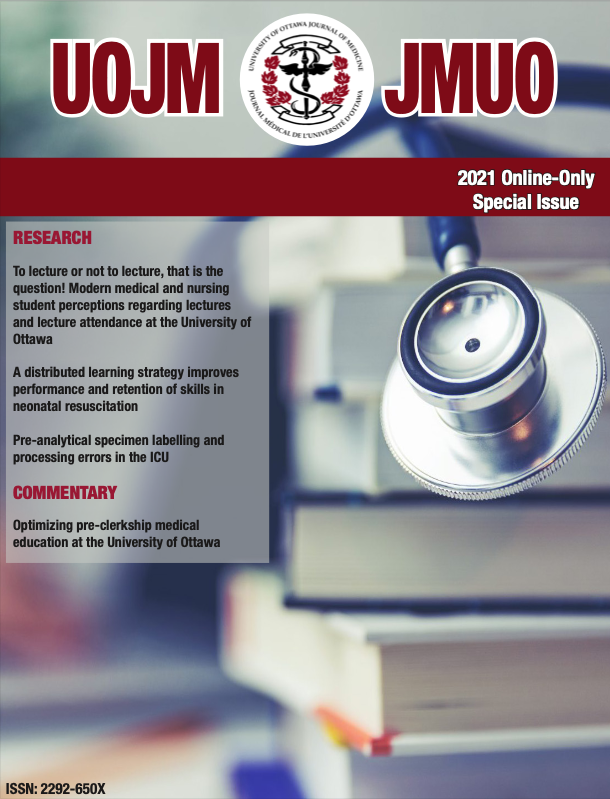Pre-analytical specimen labelling and processing errors in the ICU
Pre-analytical specimen processing errors in the ICU
DOI:
https://doi.org/10.18192/uojm.v11iS5.5747Keywords:
QI, pre-analytical, laboratory, ICU, labellingAbstract
Introduction: Specimen rejections have been associated with increased in-hospital stay and cost. The majority of errors occur in the pre-analytic phase. Specimen rejection can lead to high rate of recollection, delay in result availability, and high rate of test abandonment. These factors affect patient care and safety.
Methods: This study conducted a retrospective review of Patient Safety Learning System (PSLS) reports for the intensive care unit (ICU) at The Ottawa Hospital General Campus (TOH) between 2010 and 2018, and a prospective review using interviews, surveys, and process mapping.
Results: From 2098 PSLS reports, 52.6% were related to laboratory specimen collection and processing (pre-analytic phase). Specimen mislabelling with the wrong patient identifier accounted for 9.8% of pre-analytical error reports, while 16.4% of errors were due to non-sufficient quantity (NSQ) of specimen. 12.2 % of pre-analytical error reports involved cytology specimens.
Conclusions: Pre-analytical errors are not only costly and resource draining, but may also place a burden on patients. Areas where errors were found include labels and requisitions stored in bedside cabinets, inconsistencies between specimen labels and requisitions, out-dated and difficult to access laboratory manuals, and non-sufficient quantity specimen collection. In the future we hope to start new initiatives to tackle these issues to improve patient safety and hospital efficiencies. This includes the development of a website for the laboratory manual, so that it is more easily accessible and user-friendly. With a new electronic medical record (EMR) system at TOH in 2019, we will explore the affects of pre-analytical processing of specimens.
Downloads
Published
Issue
Section
License
Copyright (c) 2022 Long Nguyen, Sherissa Microys

This work is licensed under a Creative Commons Attribution-NonCommercial-NoDerivatives 4.0 International License.
- Authors publishing in the UOJM retain copyright of their articles, including all the drafts and the final published version in the journal.
- While UOJM does not retain any rights to the articles submitted, by agreeing to publish in UOJM, authors are granting the journal right of first publication and distribution rights of their articles.
- Authors are free to submit their works to other publications, including journals, institutional repositories or books, with an acknowledgment of its initial publication in UOJM.
- Copies of UOJM are distributed both in print and online, and all materials will be publicly available online. The journal holds no legal responsibility as to how these materials will be used by the public.
- Please ensure that all authors, co-authors and investigators have read and agree to these terms.
- Works are licensed under a Creative Commons Attribution-NonCommercial-NoDerivatives 4.0 International License.


